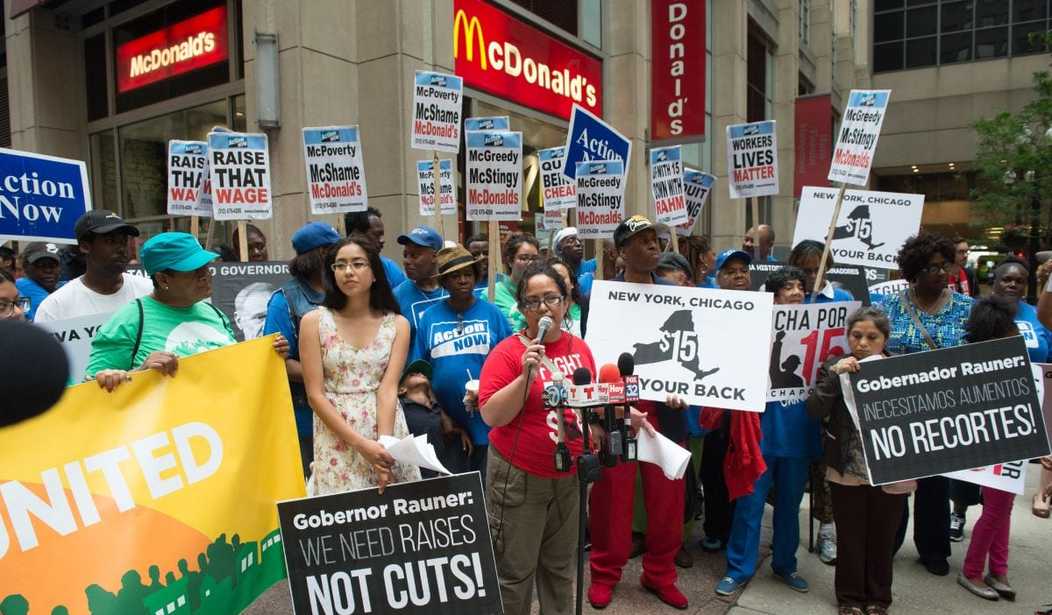On Tuesday, voters in Washington, D.C. take to the polls to vote in primaries across the district. Since D.C. is a one-party state, Democrats are practically shoe-ins, and this year few incumbents face real challenges in the primaries. The most controversial issue is a ballot initiative that would raise the minimum wage — for wait staff.
The nation’s capital has a tiered minimum wage: $3.33 per hour for tipped staff (waiters, waitresses, busboys, and bartenders), and $11.50 for everyone else. Employers must bring the worker up to minimum wage if tips don’t do the job. Initiative 77 would change that, and quite a few waiters — and more than a few local politicians — oppose it.
Initiative 77 has a few familiar leftist minimum wage provisos: raising D.C.’s minimum wage from $11.50 per hour to $15 per hour by 2020 and mandating raises in the minimum wage in proportion to the Consumer Price Index starting in 2021. The initiative would also raise tipped workers’ mandated wage to match the minimum wage by 2026.
In May, a majority of D.C.’s City Council opposed the measure. Mayor Muriel Bowser (who has no significant opposition in her primary) opposed Initiative 77.
“I think if people vote for it, they would be voting for decreasing the pay of the thousands of servers who are making a living, and a good living, in D.C. right now,” Bowser told the Washington City Paper. “We have hundreds of new restaurants that have opened across all eight wards, we have record visitation in our city, conferences coming to our city.”
“They are all going to restaurants, and they are all spending a lot of money there and leaving great tips,” the mayor explained. “And I think what’s on the table would dramatically reduce the earnings of our servers. But you don’t have to listen to me, you listen to them, and they’ll tell you, the servers across the city, they are not interested in Initiative 77.”
This opposition proves quite notable, as the tipping minimum wage issue illustrates a major problem with the minimum wage in general.
“Paternalistic governments all too often discover that the citizens they are saving often do not want to be saved,” Cato Institute Visiting Fellow Ike Brannon quipped in an article on the issue for Forbes.
He laid out the objections: “Most waiters make the lion’s share of their income from tips, and good waiters in expensive restaurants can pull down an income that’s sufficient to support a family. The fact that a sizable portion of tips at most places invariably go untaxed helps them stretch their incomes even further,” Brannon noted.
“Going from the status quo to a guaranteed $15 or $20 an hour — 100% of which would be taxed — would likely entail restaurants imposing a service charge on a check that most diners would understand to be a replacement for a tip, and a world without tips would assuredly result in a pay cut for most waiters,” the Cato scholar explained.
“Even waiters currently making less than $15 an hour would object if they aspire to remain in the profession and move up to a higher-priced locale someday, and those who are waiting tables before moving on to another career probably do not need that much occupational protection anyway,” Brannon wrote.
Liberals like Bowser who see the error in a tipped minimum wage increase, but not the error in the minimum wage in general. Like Initiative 77, a minimum wage increase actually harms the workers it is intended to help.
When D.C.’s minimum wage went up in 2016, the city lost more than 1,400 restaurant jobs.
When the minimum wage went up in Seattle, Wash., workers actually clocked fewer hours, making less money, not more. When a similar increase went into effect in San Francisco, workers also lost out — because the restaurants that employed them went out of business. Another study found that minimum wage increases set to be implemented this year would cost the country roughly 261,000 jobs. A higher minimum wage may sound like a raise, but in reality it looks more like a pink slip.
It looks more like a pink slip for the same reasons why liberals like Bowser are opposing Initiative 77. When government proclaims that workers must be paid a certain amount, labor becomes more expensive. That means workers can hire fewer people, but it also means that unskilled workers suddenly become unqualified for entry-level jobs.
Shake Shack recently announced that it would be launching more self-order kiosks, cutting out the entry-level jobs that prove so helpful for teenagers looking for their first opportunity to work.
Workers across the country depend on liberals realizing that minimum wage policies actually hurt them. The fact that Bowser and the D.C. City Council realize the problems with mandating a higher wage for tipped staff suggests that there may be hope.
Then again, Ed Lazere, the Bernie Sanders-style challenger to D.C. City Council Chairman Phil Mendelson, one of the local candidates who opposed Initiative 77, has done some polling that suggests widespread support for the ballot initiative. His poll of likely Democratic voters found that 70 percent supported raising the minimum wage of tipped workers, while only 15 percent said they opposed it.
It has been over a month since Lazere ran this poll, but D.C.’s wait staff had better hope that Bowser’s message reaches a wider audience.









Join the conversation as a VIP Member